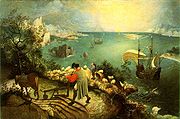
Landscape with the Fall of Icarus (poem)
Encyclopedia

Ecphrasis
Ekphrasis or ecphrasis is the graphic, often dramatic, description of a visual work of art. In ancient times it referred to a description of any thing, person, or experience...
poem by the 20th-century American
United States
The United States of America is a federal constitutional republic comprising fifty states and a federal district...
poet
Poet
A poet is a person who writes poetry. A poet's work can be literal, meaning that his work is derived from a specific event, or metaphorical, meaning that his work can take on many meanings and forms. Poets have existed since antiquity, in nearly all languages, and have produced works that vary...
William Carlos Williams
William Carlos Williams
William Carlos Williams was an American poet closely associated with modernism and Imagism. He was also a pediatrician and general practitioner of medicine, having graduated from the University of Pennsylvania...
that was written in response to Landscape with the Fall of Icarus
Landscape With The Fall of Icarus
Landscape with the Fall of Icarus is a painting in oil on canvas long thought to be by Pieter Bruegel, although following technical examinations in 1996, that attribution is regarded as very doubtful, and it is now seen as a good early copy by an unknown artist of Bruegel's original, perhaps...
, traditionally attributed to Pieter Bruegel. Williams first published the poem as part of a sequence in The Hudson Review
The Hudson Review
The Hudson Review is a quarterly journal of literature and the arts. It was founded in 1947 in New York by William Ayers Arrowsmith, Joseph Deericks Bennett, and George Frederick Morgan. The first issue was introduced in the spring of 1948...
in 1960, subsequently using the sequence as the basis for his final book, Pictures from Brueghel and Other Poems
Pictures from Brueghel and Other Poems
Pictures from Brueghel and Other Poems is a 1962 book of poems by the American modernist poet/writer William Carlos Williams. It was Williams's final book, for which he posthumously won the Pulitzer Prize for Poetry in 1963....
, published in 1962.
The poem, as indicated by the title, touches upon the Greek
Greek mythology
Greek mythology is the body of myths and legends belonging to the ancient Greeks, concerning their gods and heroes, the nature of the world, and the origins and significance of their own cult and ritual practices. They were a part of religion in ancient Greece...
tragedy of Icarus
Icarus (mythology)
In Greek mythology, Icarus is the son of the master craftsman Daedalus. The main story told about Icarus is his attempt to escape from Crete by means of wings that his father constructed from feathers and wax...
, the story in which Icarus, the son of Daedalus
Daedalus
In Greek mythology, Daedalus was a skillful craftsman and artisan.-Family:...
, took light from Crete, where he and his father were trapped in exile, wearing wings made from wax and feathers. Icarus, disregarding his father's wishes that he not fly too close to the sun, did just that and melted his way to a feathery demise, drowning in the sea. This subject—and Bruegel's painting—are also treated by another Modernist poet, W. H. Auden
W. H. Auden
Wystan Hugh Auden , who published as W. H. Auden, was an Anglo-American poet,The first definition of "Anglo-American" in the OED is: "Of, belonging to, or involving both England and America." See also the definition "English in origin or birth, American by settlement or citizenship" in See also...
, in "Musee Des Beaux Arts".

